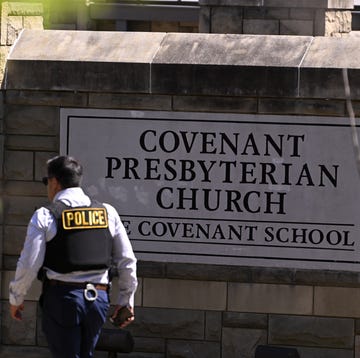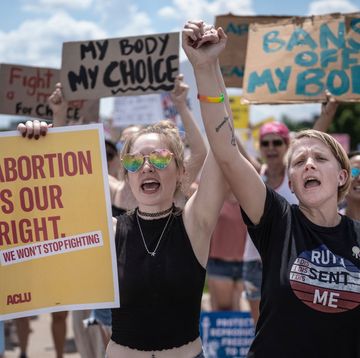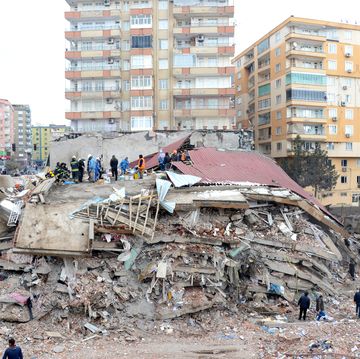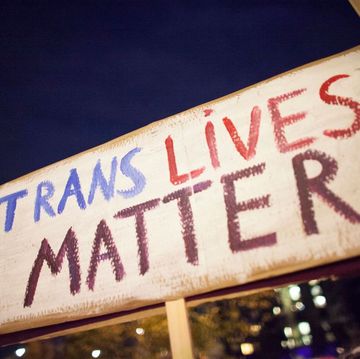I’d been an organizer for years and worked on many campaigns, but I never actually saw myself as an elected official. I eventually decided to run for the Minnesota House of Representatives in 2016 because so many people in my community were urging me to do so, and I realized that I could continue to look for that perfect candidate or I could run myself. At the time, there was an incumbent who held the seat I ran for who was there for 44 years.
I expected the relentless criticism—and much more—that I’ve received as a Somali American Muslim woman in American government. The backdrop to my running for office was Trump’s candidacy. To have a front-runner talk about the need to ban Muslims from entering this country was really inciting a lot of anger and hate. The last two years of his presidency, I was a target for his attacks in a way that was obsessive and frightening, emboldening his supporters to the point that I had a full [security] detail to provide me 24-hour protection for nearly six months.
In 2019, I joined the Foreign Affairs Committee, which has direct oversight of the State Department and all of our aid and humanitarian policies. It’s a committee that has had both a positive and negative impact on the very policies that brought me, a war refugee, to this country. At that point, there had never been an African-born congressperson on the Foreign Affairs Committee. In fact, I am the first African-born representative ever elected to Congress. I served on the Subcommittee on Africa, and our work revolved around advancing human rights, disaster assistance, holding government officials accountable for past harms, and advancing a more just and peaceful foreign policy.
More From Harper's BAZAAR

There are a lot of things that I accomplished on the committee that I’m incredibly proud of. I passed the Combating International Islamophobia Act to create a special envoy to monitor Islamophobia, as well as legislation to authorize the Office of Global Criminal Justice, which looks at transitional justice and accountability for human-rights atrocities and crimes. We also partnered with Republicans to pass the Libya Stabilization Act, which increases migrant protection against trafficking, slavery, and forced labor.
When I was removed from the Foreign Affairs Committee in February, [Speaker of the House] Kevin McCarthy and other Republican lawmakers said that it was for anti-Israel comments that I had made in the past, which I had immediately apologized for and spoken with them about. I’m always interested in learning and growing; that’s a really important character trait for any leader.
Some people also speculated that it was an act of retaliation against the removal of Marjorie Taylor Greene and Paul Gosar from their committee assignments in 2021. If you remember, these two were removed after they depicted violent imagery against their Democratic colleagues, which, in the case of Greene, included myself. The GOP’s hypocrisy hits you in the face. [Editor’s note: In January 2023, Greene and Gosar were each assigned to two committees.]
In my opinion, for some members of the GOP, my removal from the Foreign Affairs Committee was driven by anti-Muslim bigotry and a desire to other everyone who wasn’t born in this country, given those members’ past Islamophobic remarks.
When the results came in last November, it was clear that Republicans were going to be in the majority and that McCarthy would make good on his promise to remove me from the committee. On the day the vote took place, I decided to be present on the floor for the full debate. Many of my Democratic colleagues came down and talked about the impact I’d had, not only on the committee but in Congress. That was wonderful to hear. It was important to us that those who were watching got to see the diversity of the Democratic Caucus and how they unified behind me, whether it was Jewish members or members of the Congressional Black Caucus or members of the Hispanic Caucus. It made the whole thing less painful and was a juxtaposition to the lack of diverse voices on the Republican side.
What was both surprising and somewhat pathetic was that before the debate, many Republicans expressed their discomfort and anger at being made to vote. I’ve never experienced anything more shameful and spineless. I had some come to my office and say how their party was twisting their arm, how donors were calling and promises were being made. Some came up to me in the days prior to the committee removal, being like, “I love you. Hang in there. I know you’re great.” Some that I served on the committee with, some telling me they’re praying to God for forgiveness. It’s sad to this day. Some of them can’t even look at me in the face.
I have to remind myself why I’m here, why it’s important to continue to be a voice for every single person who has put their hopes and dreams in my representation. In the speech I made before the vote, it was crucial to address how we are a country of diverse voices. We are a beacon of hope. We are a country that prides itself on being a democracy, an open society, a place where open debate and discourse are encouraged. We are a country founded on dissent, and there was a mockery being made of our ideals and principal values.
But removing me from the committee didn’t stop my work. I recently reintroduced the Stop Arming Human Rights Abusers Act that is part of my Pathway to PEACE package. The legislation would create a bipartisan, independent commission modeled after the U.S. Commission on International Religious Freedom that allows for recommendations of countries to list and delist for human-rights violations before we allow arms sales to go through. And in January, I announced the U.S.-Africa Policy Working Group to help us advance more of a partnership-driven policy toward Africa by engaging with experts and policymakers based there.
Every time I’m home, I visit up to five schools; I feel the most free when I’m with young people. They are full of optimism, they are innovators, they’re free thinkers, they do not have the cynicism that has a hold on a lot of older people. And it is really an amazing experience to sit there and know that a different world is going to be possible because they’re going to work hard for it.












